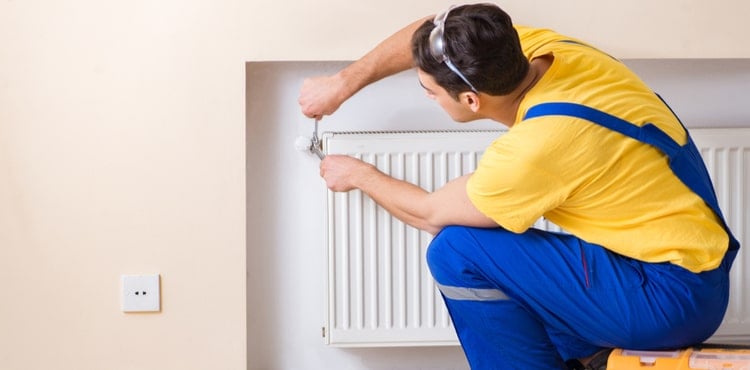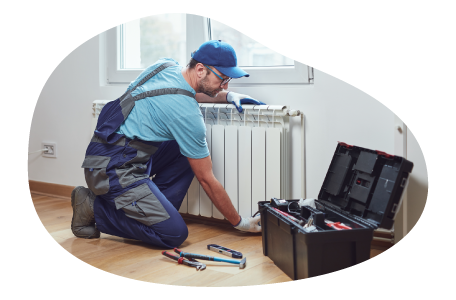What to know about handyman licenses and bonds

A handyman is typically someone who performs a variety of home repair and maintenance work. In many cases, the work isn’t extensive enough to require a construction permit.
A professional handyman might do a variety of odd jobs and home-improvement work, with or without a license. It’s important to make sure you follow handyman insurance requirements and laws, whether you intend to work as an unlicensed handyperson or as a licensed general contractor.
While licensing requirements for handyman work varies by location and your state contractor licensing board, some states require a general contractor’s license for performing work above a certain dollar amount, or for doing any kind of electrical, plumbing, asbestos, or HVAC work without the appropriate licensing to work in those fields.

When do you need a handyman license or certification?
While most states and cities don’t have a “handyman license,” they often require a general contractor’s license for jobs above a certain amount. These pricing limits include the total cost of labor and supplies, even if your customer is the one supplying the materials.
Even if there isn’t a state license requirement where you work, it may be required by your local government. Make sure you check with the authorities where you intend to work, as unlicensed contractors and subcontractors can face stiff penalties for violating the law.
You likely won’t be able to do plumbing, electrical work, or HVAC work without the right kind of license for those fields. You could also get in trouble with the authorities if you claim to be a licensed contractor but you don’t actually have a license.
Depending on the type of work you intend to do, it’s unlikely you’ll need a license to perform minor work and odd jobs such as cleaning someone’s gutters, minor landscaping, and small painting jobs.
You’ll likely need a license to perform major renovations, do structural work and hang drywall. You might also need a license to install ceiling fans.

What kind of handyman licensing requirements are there?
Overall, most states put a dollar limit on the kind of work that a handyperson can perform without a license, and this figure includes both labor and materials.
If a job costs more than your state’s limit for handyman work, don’t try to evade the limit by breaking it into smaller pieces. A home remodeling job worth $5,000 can’t be broken into five smaller pieces just to avoid a state’s $1,000 limit for unlicensed work.
If a job involves structural changes to a building, requires a building permit or includes plumbing, electrical, or HVAC work you’ll likely need the appropriate contractor’s license from your local government or contractors state license board.
Here’s a few examples of how different states set the rules for contractors and their handyman exemptions:
Arizona
A license isn’t required for someone who works on jobs of less than $1,000 that don’t require a building permit. Arizona requires a contractor’s license to perform any work that requires a building permit or costs more than $1,000.
California
California requires a handyman working on jobs worth more than $500 to have a general contractor license from the state, although there is no limit if the work does not become a fixed part of the structure. This licensing requirement includes things like a painting job worth more than $500 that would require a painting contractor’s license.
Florida
Florida doesn’t require a license for non-structural work, such as minor repairs, carpentry, and installations.
Florida does require a general contractor license for structural work, construction, and roofing. In order to obtain the license, you must have records of four years of experience and pass an exam. In addition, you must show proof of general liability insurance and workers' compensation insurance.
Georgia
Georgia requires a Residential Contractor license for any handyman who works on projects worth more than $2,500. In order to receive your license, you must show proof of general liability insurance and workers' compensation insurance.
Nevada
Nevada requires a contractor’s license to perform any maintenance or repair work that’s worth more than $1,000 or requires a building permit. A license is also required to do the kind of work performed by a licensed plumber, electrician, refrigeration or HVAC contractor.
Texas
Texas doesn’t have a statewide handyman license requirement, although many local governments do have licensing rules for general contractors and similar work. You might have to secure a small business license or registration with your local government as well.
Utah
Utah requires a handyman working on jobs of more than $3,000 to have a state contractor’s license. If a job is worth more than $1,000 and less than $3,000 you’ll need to file an affirmation of exemption through the Division of Professional Licensing and prove that you carry both general liability and worker’s compensation insurance.
How do you get a handyman license or certification?
While a “handyman license” doesn’t really exist, many states and larger municipalities have licensing requirements to perform certain kinds of home repair and maintenance work, or to work on jobs of a certain value.
Depending on your state and local regulations, you may need a general contractor’s license or a home improvement contractor registration for certain types of construction work. You might also need a business license from your local government or registration with your secretary of state.
The first thing to consider is the type of jobs you intend to work on, what the cost of labor and materials will be and whether any of these jobs would require a building permit. Then compare your state and local requirements to make sure you comply with the law.
You might also want to consider whether you’ll have an operating name for your handyman business, or whether you’ll work under your own name. If you intend to use a “doing business as” name instead of your legal name, you may have to register your DBA with your local, county, or state government. You’ll also have to decide whether you’ll perform your handyman services as a sole proprietor or as an LLC.
To obtain a general contractor’s license, plumber’s license, electrician’s license, or a license for HVAC maintenance and repair, you are generally required to have:
- A background check and clean record with no felonies
- A high school diploma or GED
- A bachelor’s degree (for some licenses)
- A minimum number of hours of classroom training and a few years of experience working under a licensed journeyman contractor
- Records of passing a state test with your state’s licensing board
- A license application that include your business name, and proof of insurance or bonding requirements

What bonds and insurance coverage does a handyman need?
While handyman insurance requirements vary by state, having the right coverage can help you survive a financial mishap and may be required for certain jobs.
Workers' compensation insurance
Workers’ compensation insurance is required by most states for businesses with one or more employees. If you work on your own, this coverage can still protect you in case of a work-related accident or illness. Your health insurance is unlikely to cover you for a work-related mishap, while worker’s comp can help cover your medical bills and lost wages while you recover.
Surety bonds
Surety bonds may be required to secure contracts, especially if you do work for your state or local government. A surety bond is a financial guaranty where the insurance company pays the client if you fail to complete a contracted job.
General liability insurance
General liability insurance insures you against common business risks like customer injuries, customer property damage, and advertising injury. It’s often the first insurance policy bought by small business owners.
Business owner's policy (BOP)
A business owner’s policy (BOP) can save you money on your commercial property insurance and your general liability coverage, as the BOP combines both policies and is usually cheaper than buying them separately.
Contractor's tools and equipment insurance
Contractor's tools and equipment insurance covers the cost of repair or replacement of your tools and equipment if they’re lost, damaged, or stolen.
Commercial auto insurance
Commercial auto insurance covers your legal bills, medical expenses, and property damage costs if your work vehicle is involved in an accident. It is required in most states for businesses who own or rent vehicles.
Compare small business insurance quotes from trusted carriers with Insureon
Complete Insureon’s easy online application today to compare insurance quotes from top-rated U.S. carriers. You can also consult with an insurance agent on your business insurance needs. Once you find the right types of coverage for your small business, you can begin coverage in less than 24 hours.







